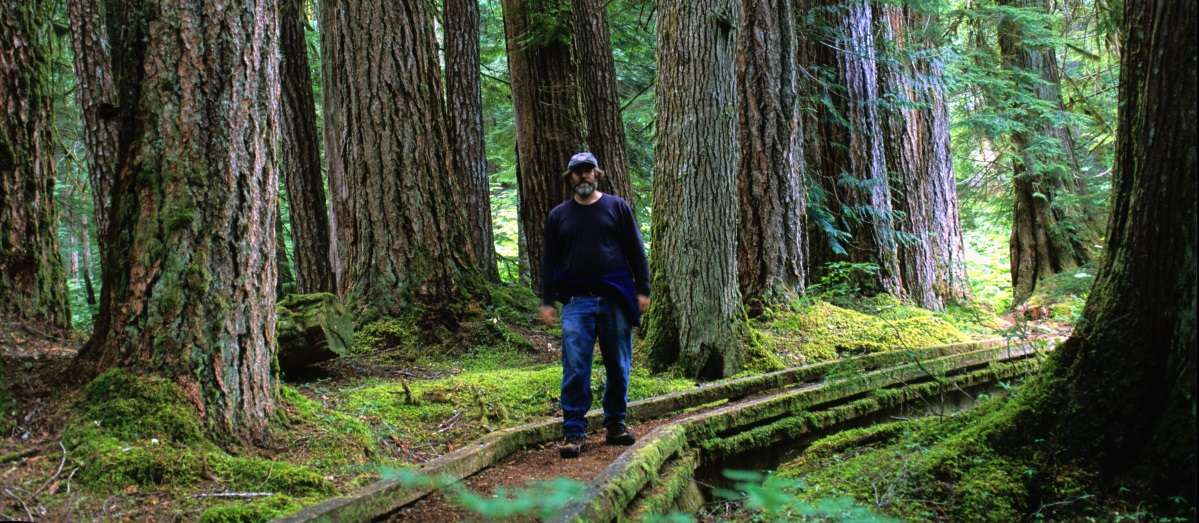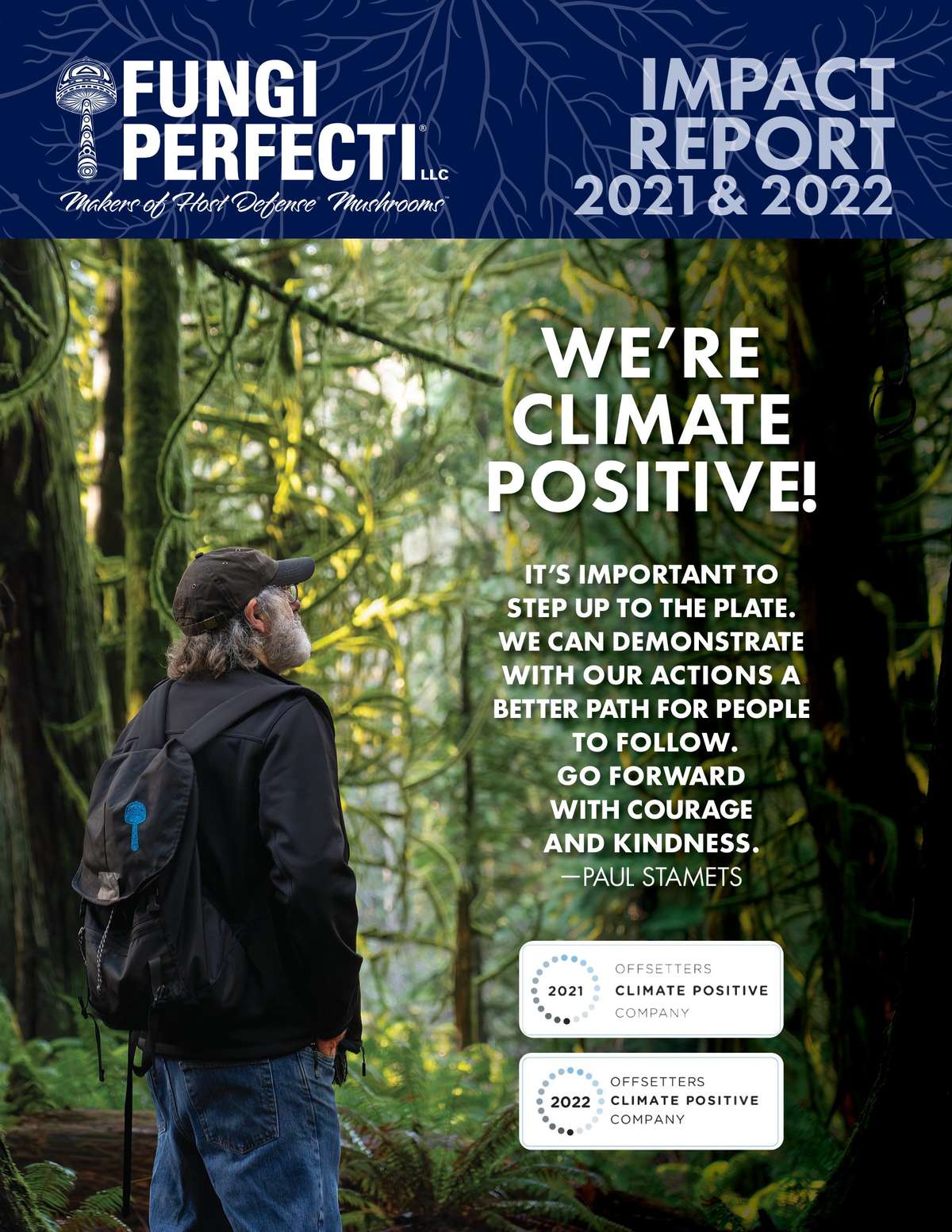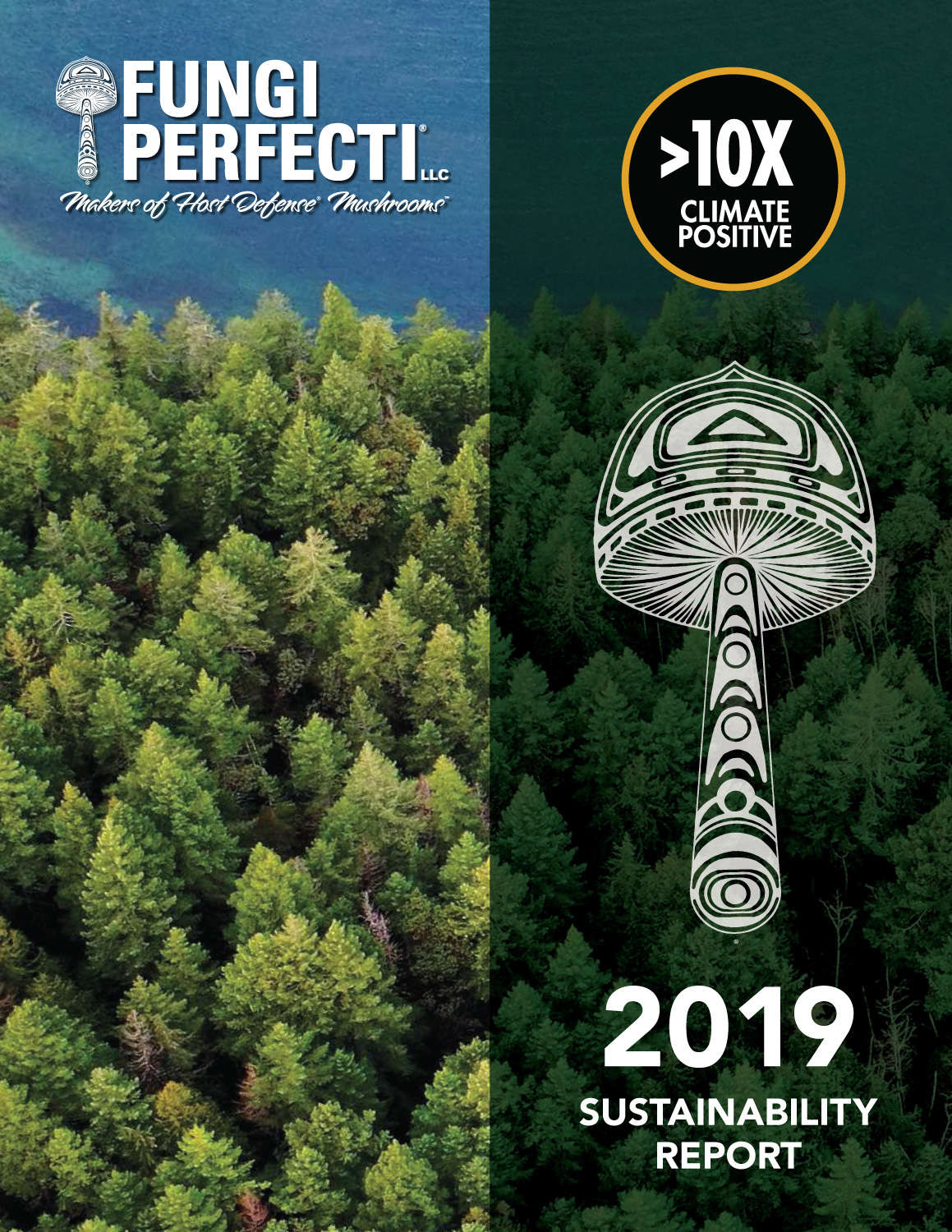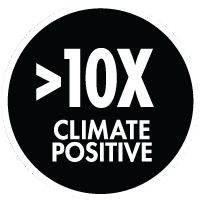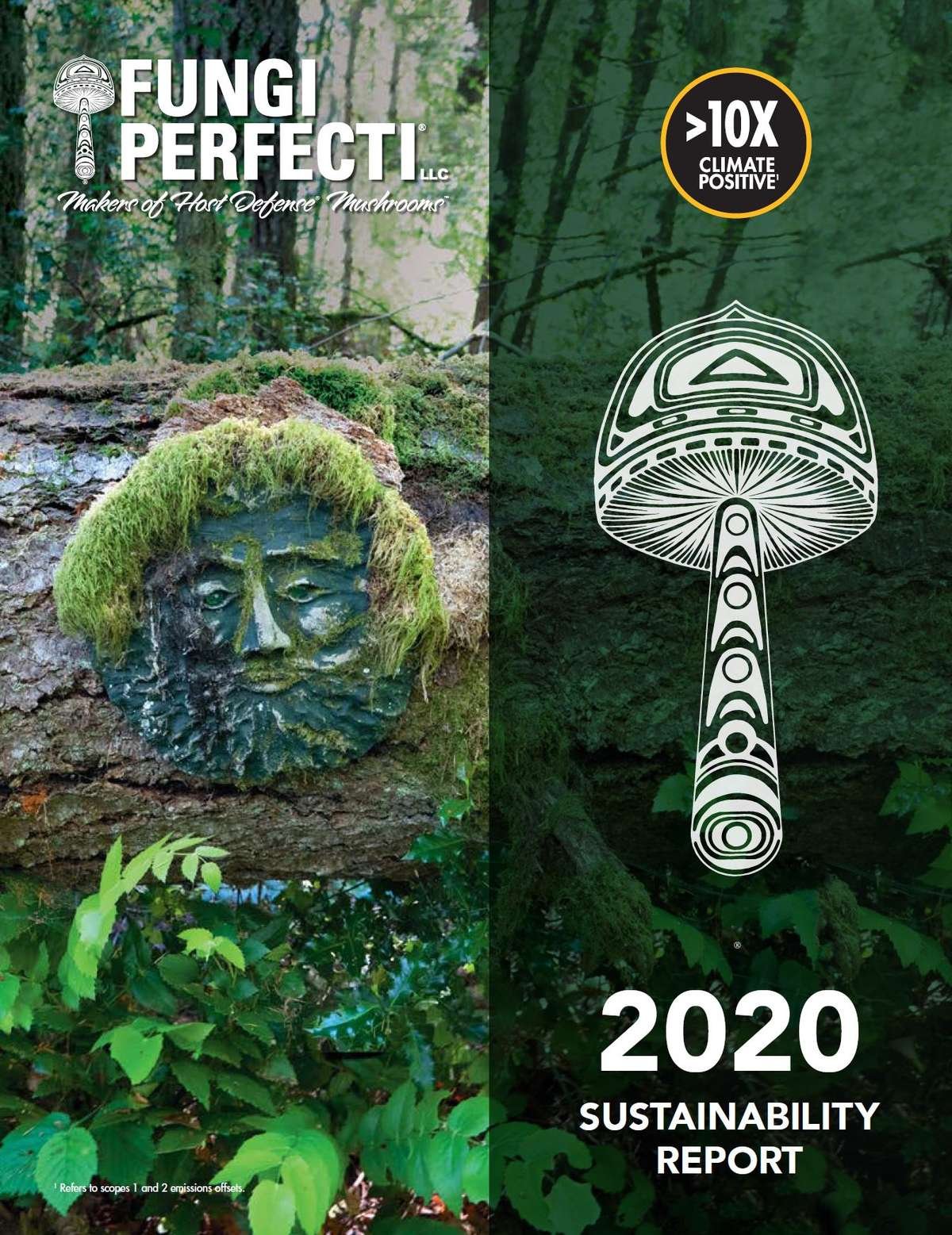Fungi Perfecti Impact Report
DOWNLOAD 2021 - 2022 EDITION
— Paul Stamets
By purchasing a Host Defense product, you’re helping to offset over 10% more carbon emissions than were released to produce it!
OUR STORY
Paul Stamets started Fungi Perfecti® with the goal of building the bridge between people and fungi. Since its inception, through the work of Paul and his dedicated team of mycophiles, Fungi Perfecti® has become synonymous with cutting-edge mycological research and innovative mycological solutions. This is also the foundation of the Host Defense® brand. Our continued mission is to explore, study, preserve, and spread knowledge about the use of fungi for helping people and planet.
Our sustainability efforts are a natural extension of that mission, including our commitment to organic, sustainable cultivation practices for all our mushroom fruitbodies and mycelium. Avoiding the use of harmful, toxic chemicals not only protects biodiversity, but promotes the health and resilience of the surrounding environment. Organic means healthy people and a healthy planet!
OUR SUSTAINABILITY INITIATIVES
Sustainability has always been among our core values at Fungi Perfecti® and Host Defense®. As our production and operations expanded, so has our environmental footprint, along with the need to formalize our commitment to sustainability. In 2018 we established a Sustainability Committee which manages sustainability efforts by carefully assessing the environmental impact of our activities, identifying opportunities for improvement, and determining the most impactful areas of action. We also promoted a member of the Sustainability Committee to the role of Sustainability Analyst. This role is dedicated to identifying areas of opportunity, facilitating action, and monitoring progress on our sustainability initiatives full-time.
Our Climate Commitment
While we've always considered our overall footprint and worked to limit the environmental impact of our business, we are increasingly focused on how we can move forward in a way that creates a more positive impact for people and planet.
For us, being carbon neutral isn’t enough. In addition to offsetting 100% of the combined totals of our scopes 1, 2 & 3 emissions, we’ve gone even further and offset an additional 10% - that’s 10% MORE emissions than we produce for a total of 110%. This has earned us the Ostrom Climate Solutions Offsetters CLIMATE POSITIVE status!
Our Carbon Footprint
One of our most important sustainability goals is measuring and reducing our carbon footprint. The first step was conducting a thorough assessment of our emissions for 2018. This gave us a starting point—a baseline year—so that we can track future progress, quantify our accomplishments, and ensure we have set ambitious yet realistic goals.
In order to better understand our climate impact, we “normalized” the emissions data by calculating kilograms CO2-e (carbon dioxide equivalent) released per kilogram of mycelium we grew. This is also known as emissions intensity.
Fungi Perfecti® is growing, so our total annual emissions is greater in recent years than what we calculated for 2018. However, our production efficiency continues to increase and we continue to support high-impact offset projects to keep up with the growth that allows us to offset our scopes 1, 2 & 3 emissions by 110%!
The Climate Collaborative
In March 2019, we made commitments to The Climate Collaborative. The Climate Collaborative was born from a shared belief amongst natural products leaders that the industry has potential to reverse the effects of climate change. The Collaborative is made up of manufacturers, retailers, distributors, brokers, suppliers, and other concerned businesses from the natural products industry.
We have made commitments in the 5 impactful areas of: energy efficiency, packaging, renewable energy, transportation, and forests.
The target goals we will work toward are listed below, followed by the progress to-date in each commitment area:
RENEWABLE ENERGY
Goals:
- Work toward shifting away from fossil fuels at the earliest possible date.
- Adopting alternative energy sources, including: solar, purchasing green power, and geothermal.
Progress:
We have been working to shift away from fossil fuels, and transition to 100% renewable electricity by the earliest possible date. We installed a 12 KW grid-tied photovoltaic system on the roof of our main lab. These solar panels will produce an average of 12,000 KW per year, which is roughly 3% of our total electric consumption at that facility. We have the potential to expand this system to 100 KW - which would produce up to 100,000 KW per year - allowing us to generate nearly 30% of the electricity needed to run the facility on-site. Currently, 98% of the power that we purchase through Mason County PUD comes from renewable sources, including wind and hydroelectric.
ENERGY EFFICIENCY
Goals:
- Improving efficiency of buildings.
- Improving efficiency of lighting.
- Improving efficiency of HVAC equipment.
Progress:
We have been working closely with our energy supplier to increase energy efficiency, including upgrading inefficient lighting with LED bulbs, which produce the same amount of light using far less energy, and installing more efficient HVAC (heating, ventilation, and air conditioning) equipment in our production labs. We have significantly improved the energy efficiency of our information technology (IT) systems, reducing the average energy consumption for our computer workstations and servers by roughly 70%. We also consolidated multiple office locations under one roof in 2019, which reduces energy use and greatly increases operational efficiency.
FORESTS
Goals:
- Set targets to work toward 100% deforestation-free commodities.
Progress:
A majority of the paper and cardboard we use for our printed materials and packaging contain recycled fiber or are made from 100% recycled materials. We are also assessing our supply chain to make sure we are using the most environmentally friendly options available. In addition, we are sponsoring offset projects that establish carbon-sequestering forests.
PACKAGING
Goals:
- Reducing materials, or “source reduction.”
- Replacing virgin materials with post-consumer recycled content.
- Replacing traditional plastics with biopolymers.
- Redesigning packaging to use materials more efficiently.
Progress:
We have always been aware of the environmental impact of our packaging. Since the launch of our Host Defense® supplement line, we have only used 100% post-consumer recycled plastic bottles, so no virgin plastic is required to produce our capsule containers. We use 85% to 100% recycled fiber for cardboard cartons. We have also begun performing life cycle assessments (LCA) to analyze the environmental impact of each and every stage of the product’s life-cycle.
TRANSPORTATION
Goals:
- Develop a green transportation action plan to improve transportation efficiency.
- Develop performance metrics to track transportation efficiencies.
- Establish a method for tracking reduction of black carbon and other short-lived pollutants.
Progress:
We are currently developing a green transportation action plan to improve the efficiency of our supply chain, and establish a method for tracking reduction of black carbon and other short-lived pollutants.
»
Our BeeFriendly™ initiative continues to progress. In 2019, we contributed an additional $50,000 to fund bee research at Washington State University, bringing our total contribution to-date to >$200k. Ground-breaking peer-reviewed research was published in 2018 examining how mushroom mycelium extracts support health in bee populations. The Fungi Perfecti® BeeMushroomed™ Feeder and Extract are currently in development, and we hope they will create powerful points of health and nutrition for bees all across our shared landscapes. Bees and other pollinators are essential to producing food for the world’s growing population, and maintaining healthy, active ecosystems.
Global Carbon Offset Projects
In addition to decreasing our negative impact, we’re actively increasing the positive impact we have on the environment and in our local and global communities. Not all offsetting projects are created equal. We did significant research to ensure that our efforts were going to a good cause. By selecting multiple offset projects located across the globe that are aligned with our values and support United Nations Sustainable Development Goals, we are diversifying our impact. Projects we've supported:
Mootral Cowcredits
Cattle are a crucial factor in our environmental ecosystem and the economy. However, through their digestive process they emit significant amounts of methane. Methane is the second most abundant greenhouse gas and more detrimental than carbon dioxide. The Mootral Ruminant feed supplement significantly reduces enteric methane emissions from cattle, creating the world’s first carbon credits from a reduction in enteric methane! The supplement includes garlic and citrus extracts, and suppresses methanogenic fermentation and emissions in the rumen of dairy cows.
Sumatra Merang Peatland Project (SMPP)
The SMPP aims to protect and restore over 22,000 hectares (ha) of peatland within the Merang-Kepayang peat dome, one of the largest carbon-rich peat swamp areas in Sumatra, covering more than 150,000 ha. This peatland ecosystem is at high risk for decimation and conversion into industrial agriculture, which would lead to lowered water table levels and elevated greenhouse gas emissions due to increased microbial decomposition of the peat. The SMPP also restores habitat for endangered and threatened species such as the Sumatran Tiger and the Sun Bear.
The Kulera Landscape Redd+ Program
This program was designed to reduce deforestation in Malawi by providing critical resources to protect forests that are home to rare and endangered species such as the African elephant and promote sustainable agriculture. The communities can also implement a household-level solar program, bringing light to rural villages, as well as producing cash crops and value-added products. The Kulera Program completed verification of emission reductions under the Verified Carbon Standard and was only the third in the world to do so with a Triple Gold Level Climate, Community and Biodiversity, demonstrating that this project meets the highest criteria for mitigating and adapting to climate change, empowers communities, and protects endangered species.
Clean Water Project: Honduran Coffee Growers
Promotes sustainable development and improves the health and well-being of communities involved in the coffee production process. This project provides families with water filters, which allow them to avoid burning wood for boiling water. This improves air quality and reduces deforestation. Improving access to clean drinking water not only helps the people, it makes the coffee supply chain more resilient by allowing producers to save on fuel, medicine, and clean water costs and invest those savings in their farm, their children’s education, and their overall livelihood.
WithOneSeed Community Forestry Program: Timor-leste
Small-holder subsistence farmers receive an annual incentive payment for planting, managing, and maintaining trees on their land. The program has embraced the UN’s Sustainable Development Goals to end poverty, protect the planet, and ensure prosperity for all.
Biogas Digesters: Vietnamese Farmers
Rural family farms are installing biogas digesters to manage waste and gain access to clean energy. One biogas digester produces enough methane to provide energy for cooking or other needs in several homes, saving families money. By channeling and reusing methane (25 times more harmful to the environment than carbon dioxide), they reduce emissions from this greenhouse gas. Also, families do not have to use firewood, helping to protect local forests.
2021-2022 IMPACT REPORT
Learn more about our sustanability efforts by Downloading the 2021 - 2022 Report!


